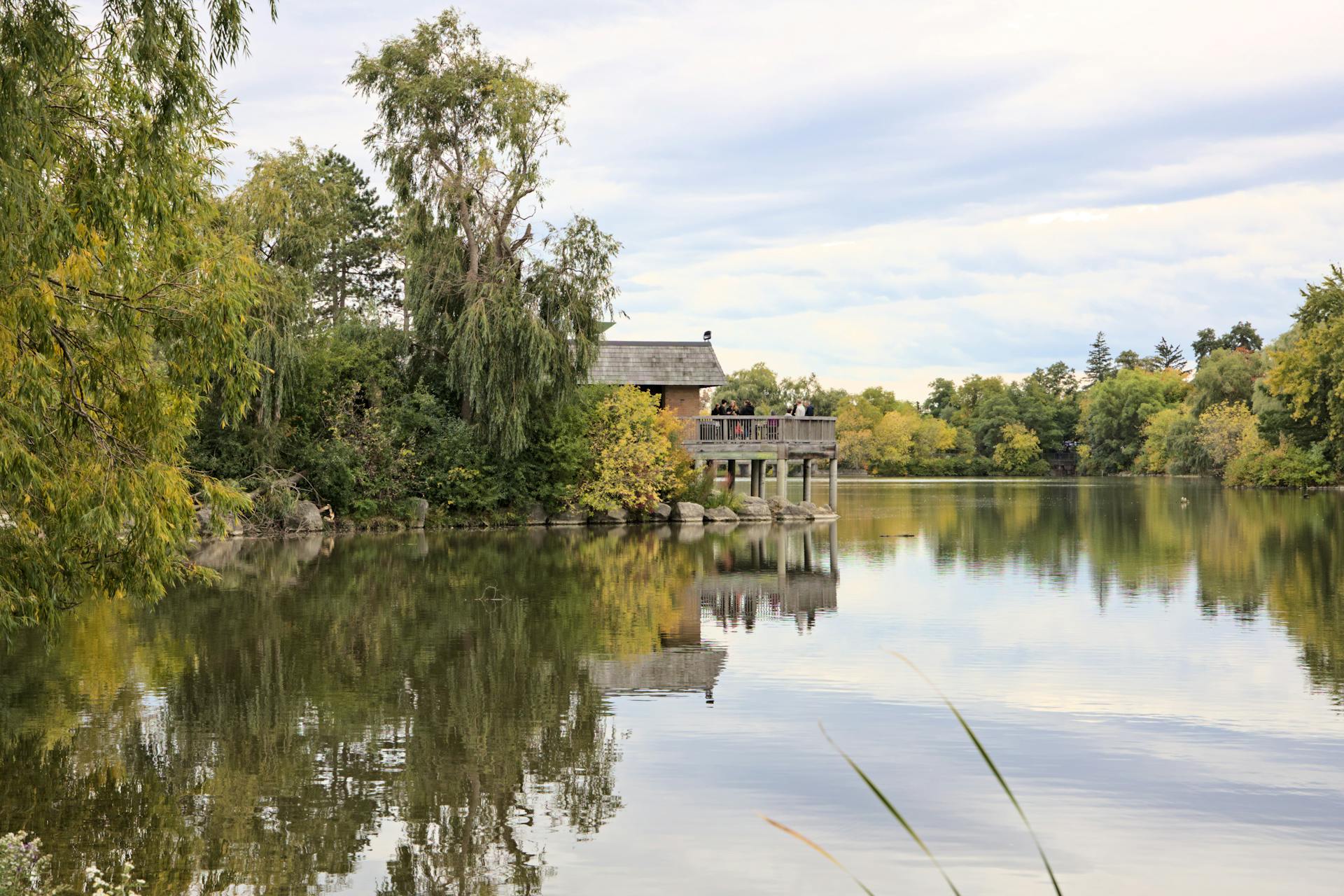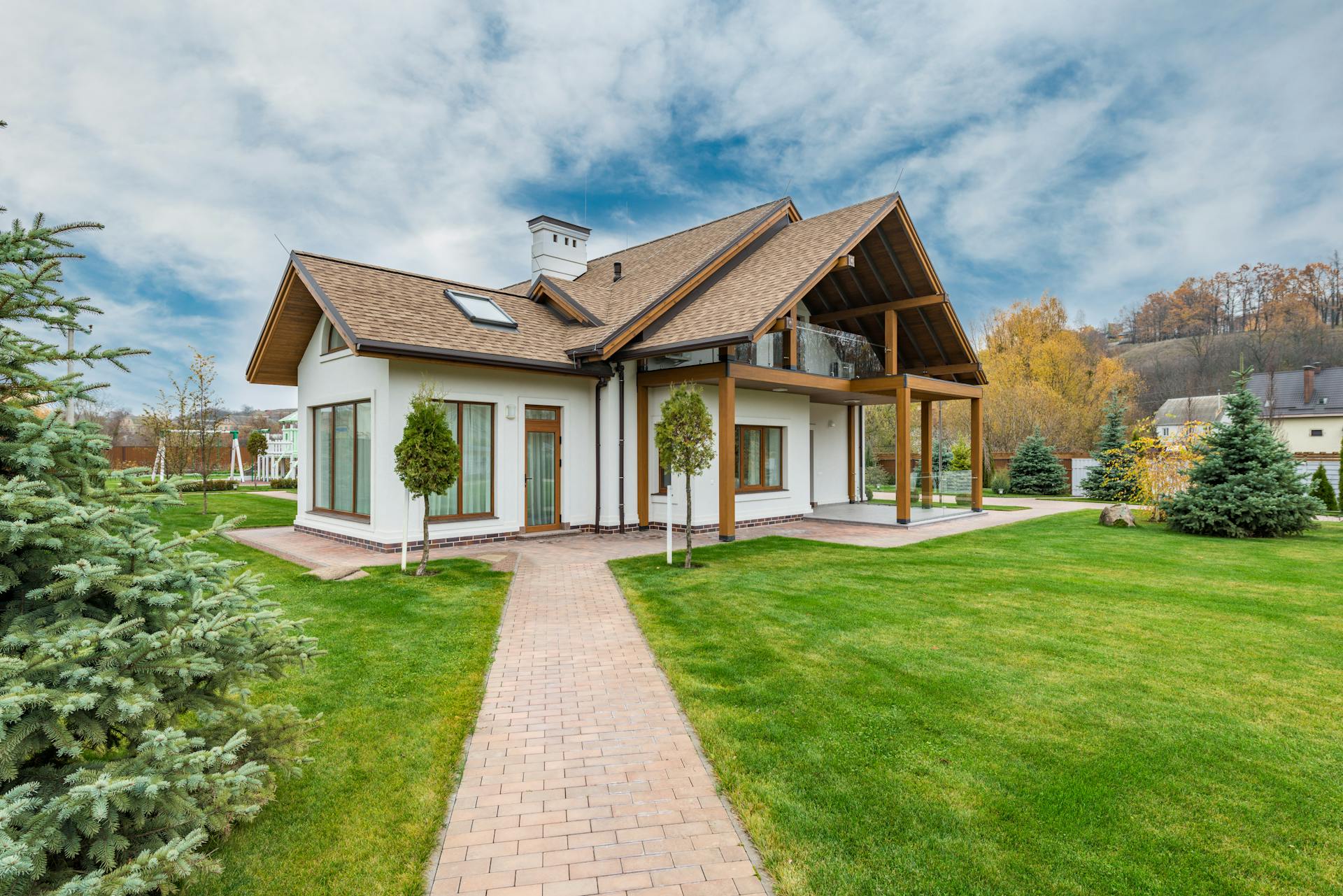
Are you tired of your outdoor space looking drab and uninviting? With an under-deck roof, you can easily transform your backyard into an amazing oasis that is perfect for entertaining guests or relaxing with family. An under-deck roof is a unique addition to any home that not only adds value but also functionality to your outdoor living space.
An under-deck roof is essentially a waterproof barrier that is installed beneath the deck boards of your outdoor area. This roof allows you to enjoy your outdoor space even when the weather isn't cooperating. No more worrying about rain ruining your barbeque or outdoor party! Additionally, an under-deck roof provides shade from the sun, making it a great spot to relax on hot summer days.
Curious to learn more? Check out: What Is a Gable Roof
Screw the Panels to the Purlins
If you want to make waterproof deck systems, screwing the panels to the purlins is one of the most important steps. As explained by Family Handyman, this involves cutting panels to size with a carbide blade and end attaching them to the purlins using roofing screws. To ensure a tight fit, you should also overlap the washers slightly and place the screws in a valley snug.
Although it may seem like a small detail, screwing the fiberglass panel to the purlins is crucial for creating an effective under deck roof. This step will not only keep your deck dry during rainy weather but will also prevent water from seeping into your home's foundation. By following these simple instructions and using quality materials, you can make sure that your deck stays dry and comfortable for years to come.
Creating a Rooftop Deck: What You Need to Know

Are you considering adding a rooftop deck to your home or building? Before starting the construction project, remember to assess the square footage of your desired rooftop deck and consider the materials needed for the job. You can use an online calculator to get an estimate of your roof top deck cost, but keep in mind that costs may vary depending on extra features such as railings, stairs, and built-in add-ons like bar heating and audio.
When planning your rooftop deck costs, don't forget to factor in labor costs depending on the construction project size. Additionally, you may need structural engineering plans and a building permit for larger rooftop decks. Materials remember to include are high-quality composite rooftop decking boards or traditional wood deck boards for a classic look.
Finally, consider any extra features you want on your rooftop deck such as an outdoor kitchen or built-in seating areas. Keep in mind that these features will add more cost to your overall project budget. With careful planning and consideration of all factors including materials and labor, you can create a stunning oasis with breathtaking views of the city skyline without breaking the bank.
Create Your Dream Hangout: Crafting Your Own Rooftop Deck
Creating a rooftop deck can be an exciting and rewarding project for anyone who loves to entertain or simply relax outdoors. Before you get started, make sure you've considered all your options and checked local regulations to ensure your plans are allowed. Once you're ready, the main steps involve designing your dream hangout space, finding a qualified builder to help you bring it to life, and adding finishing touches like plants and lighting to create the perfect ambiance. With a little creativity and planning, your rooftop deck can become a favorite spot for friends and family alike.
1. Step 1: Prepare the Roof & Gather Materials
Step 1 in installing an under deck roof is to prepare the roof and gather materials. To start, you'll need to ensure that the roof is clean and free of any debris. Next, you'll want to install deck sleepers or wood framing on top of the roof using an adjustable pedestal system.
Once your framing is set up, it's time to gather your roof deck materials. This can include a range of options such as rooftop decking tiles or panels made from composite materials. With your materials in hand, you're ready to move on to Step 2: Installing the Under Deck Roof.
Broaden your view: Framing a Garage
2. Step 2: Prep Sill Plates & Support Beams
Step 2 of the under deck roof installation process involves prepping the sill plates and support beams. The sill plates are horizontal pieces of wood that sit on top of the foundation, while the support beams are vertical pieces of wood that hold up the deck.
To prepare these components, it's important to use galvanized hardware to prevent rusting from exposure to salt water. This will ensure that your under deck roof is durable and can withstand harsh weather conditions. Properly prepping the sill plates and support beams is crucial for a successful installation, so take your time and pay attention to detail during this step.
3. Step 3: Join the Beams with the Sill Plates
Step 3 is where the real work begins. It's time to join the beams with the sill plates. The sill plates label will help you identify which plate goes where. Be sure to use galvanized bolts and nuts to secure everything together tightly.
The beams and sill plates work together to create a strong foundation for your under deck roof. Once they are joined, you can move on to installing joists and decking. Take your time during this step and double-check all measurements before drilling any holes. With a little patience and attention to detail, your under deck roof will be ready in no time!
4. Step 4: Install Joists & Framing
Step 4 of installing an under deck roof involves setting up the framework with joists. This is where the real construction begins, as you'll need to ensure that the joists are properly spaced and level. The framing should be sturdy enough to support the weight of the roof material you plan on using, so it's important to choose a high-quality wood or metal for your joists.
Once your framework is in place, you can begin attaching the roofing material of your choice. Whether you opt for a simple tarp or a more durable metal sheeting, make sure that it's securely fastened to the joists and won't sag or shift over time. With proper installation techniques and high-quality materials, your under deck roof can provide years of protection from the elements while enhancing your outdoor living space.
5. Step 5: Install Deck Boards
Now that you have completed the under deck roof installation, it's time to finally lay down the deck boards! As mentioned earlier in this article, it's important to choose the right type of wood for your decking. Cedar and redwood are great options since they are naturally resistant to rot and decay.
To begin work on installing the deck boards, start at one end of the deck and work your way towards the other end. Make sure to leave a small gap between each board so that water can drain properly. Use screws instead of nails to secure the boards in place as they will be less likely to pop out over time. With these steps complete, your under deck roof is now complete and ready for use!
Discover the Impressive Style of Deck Ceiling Design
If you're looking for a low-cost easy-to-build solution to create dry space under your deck, installing an under deck roof might be just what you need. A home-built deck drainage system catches rainwater and runoff from your deck boards, keeping the area below it dry and protected from the elements. You can enjoy warm summer rainstorms on your covered patio without getting wet!
Commercial waterproof deck systems can be expensive and complicated to install, but with some basic materials found at any home center, you can build a DIY version that's just as effective. In case you'd like a more finished look, you can choose to install a roof version that complements your house's style. A retired electrician who spent the past 20 years building his dream lakeshore cabin garage shares his tips for creating this impressive style of deck ceiling design.
Discover more: Backyard Decks Build
Expert Tips for Attaching Purlins to Your Deck Roof

Looking to add an under deck roof to your outdoor space? Family Handyman has got you covered with expert tips on attaching purlins. To start, measure out 3 ft from the outer end of your deck joists and mark these purlin locations. For decks longer than 12 ft, place additional marks at every 12 ft.
Next, install spacer blocks between the deck joists at each of the marked purlin locations. These spacer blocks should be cut to size based on measurements minus the width of your outer purlin. Once in place, attach your purlins to each spacer block using screws or nails.
Finally, it's important to note that attaching purlins in this way will provide drainage for rainwater or snow melt. This means that water won't accumulate on top of your under deck roof and cause damage over time. By following these simple steps for attaching purlins, you'll have a sturdy and functional under deck roof in no time!
Gathering the Essentials for a Striking Deck Drainage System
Creating an under-deck roof that will keep you dry while enjoying the outdoors requires careful planning and essential materials. To start, you'll need to measure the area to cover and purchase corrugated fiberglass panels that fit your dimensions. Head over to your home center and pick up 12 ft long panels, special roofing screws with hex heads, neoprene washers to prevent leaks, and spacer blocks to create slope figure.
Gutters aren't required for an under-deck roof, but water drains better when there is something in place. Prevent splashing by installing gutters. Rune chose PVC gutters because they're inexpensive and easy to work with. To install gutters, you'll need gutter straps, end caps, downspout outlet, and downspouts. Use special glue for plastic roofing panels or galvanized steel screws for fiberglass roofing. With careful planning and quality materials, you can create a striking deck drainage system that will ensure water falls where it should – away from your patio!
Frequently Asked Questions
How to build a roof over my existing deck?
To build a roof over an existing deck, you will need to consider the design and materials, obtain necessary permits, and hire a professional contractor if necessary. It is important to ensure that your roof meets local building codes and is properly installed for maximum safety and durability.
Can you build a prefabricated under deck ceiling?
Yes, it is possible to build a prefabricated under deck ceiling. This type of ceiling can be installed quickly and easily, making it a popular option for homeowners who want to maximize their outdoor living space.
What is the difference between a deck and a porch roof?
A deck roof is built over an outdoor space that is not connected to the house, whereas a porch roof is attached to the house and provides cover for a porch or patio. The main difference is in their location and attachment to the house.
How to build a roof over an existing deck?
To build a roof over an existing deck, you'll need to follow these steps: 1) Install support posts and footings, 2) Attach the ledger board to the house, 3) Install the roofing materials. It is recommended to consult with a licensed contractor to ensure safety and code compliance.
How much does it cost to build a roof over a deck?
The cost of building a roof over a deck can vary greatly depending on the size, materials used, and complexity of the design. However, on average, homeowners can expect to spend between $8,000-$12,000 for a basic roof structure.
Featured Images: pexels.com

